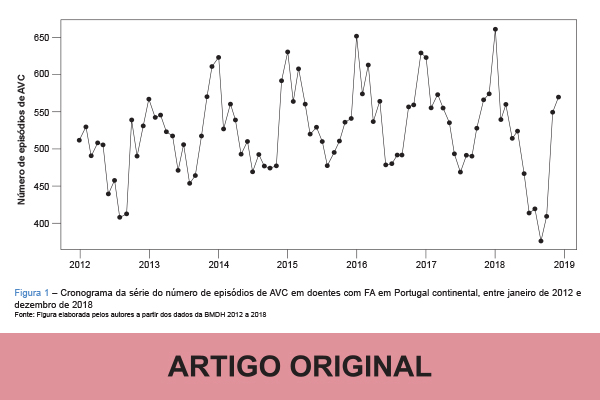SOCIAL MEDIA
Portuguese Medical Association's Scientific Journal

Introduction: Atrial fibrillation is the most prevalent persistent dysrhythmia, contributing to a significant social and economic burden. The main objective of this study was to evaluate the association between oral anticoagulant use and the incidence of stroke associated with atrial fibrillation, in mainland Portugal.
Methods: The number of episodes of inpatient care with a main diagnosis of stroke and an additional diagnosis of atrial fibrillation, occurring monthly between January 2012 and December 2018, in individuals aged 18 years or over, was extracted from the hospital morbidity database. The number of patients with an atrial fibrillation code documented in this database was used as a proxy for the prevalence of known atrial fibrillation. The number of anticoagulated patients was estimated from total medicine sales of vitamin K antagonists and novel oral anticoagulants (apixaban, dabigatran, edoxaban and rivaroxaban) in mainland Portugal. Descriptive analyses were performed, and seasonal autoregressive integrated moving average (SARIMA) models were built using the R software.
Results: The mean number of episodes of stroke per month was 522 (± 57). The number of anticoagulated patients increased gradually from 68 943 to 180 389 per month. The decreasing trend in the number of episodes has been observed since 2016, along with the increased use of new oral anticoagulants compared to vitamin K antagonists. The final model indicated that the increase in oral anticoagulation use between 2012 and 2018, in mainland Portugal, was associated with a decrease in the number of episodes of stroke associated with atrial fibrillation. It was estimated that the shift in the type of anticoagulation used, between 2016 and 2018, was associated with a reduction of 833 episodes of stroke in patients with atrial fibrillation (4.2%).
Conclusion: The use of oral anticoagulation was associated with a reduced incidence of stroke in patients with atrial fibrillation in mainland Portugal. This reduction was more relevant in the period between 2016 and 2018, and is probably related with the introduction of the novel oral anticoagulants.